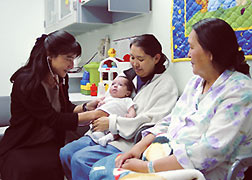|
High-Desert Doctor
Miran Song ’87 serves on the staff of the Indian Health
Service in Kayenta, Arizona
by Christine Palm
| |
|
 |
|
|
photo: Philip Bouchard |
|
Downtown Hartford may seem light years away from a remote
butte in Arizona, but for Miran Joelle Song ’87, the
distance is bridged by a longtime passion—fighting poverty.
While an undergraduate at Trinity majoring in biochemistry, Song
volunteered at a Hartford soup kitchen, where she was especially
moved by the plight of impoverished children. After years of
medical training, Song has worked since 1999 as a pediatrician,
serving members of the Navajo Nation in Kayenta Health Center in
Kayenta, Arizona. Now, as then, she is especially concerned with
the health issues of children hard hit by poverty and despairing
parents.
“I’ve always enjoyed working with children,” she
says. “They are incredibly resilient in their bodies and
spirit. The level of poverty is striking, and working here can
truly have a positive influence on children’s lives and
health.”
The Health Center comprises a day clinic and a 24-hour emergency
room, where each day, Song encounters a wide range of health
issues in her clientele, including trauma from motor vehicle
accidents, domestic violence, and assaults. She and her medical
team help stabilize critical patients, who are then transported
by ground or air to the area hospitals. But since the nearest
hospital is 150 miles away in Flagstaff, the demands of her
emergency room are enormous.
“We all work in the emergency room on rotating shifts
regardless of specialty training,” Song explains. “This
can be stressful, but we have many specialists with whom we do
telephone consults.”
In addition to emergencies, Song treats major chronic health
problems, including diabetes (with the concomitant complications
of renal failure, coronary heart disease, and blindness),
obesity, depression, and alcoholism. Forty percent of the
children she treats have obesity, but while the Native American
population in general suffers a very high rate of alcoholism,
Song says she sees “surprisingly few” cases of fetal
alcohol syndrome (FAS/FAE) because most of the alcoholics are
male.
“The severity of infections seems to be much worse,”
she says. “This may be due to the fact that about 40 percent
of homes do not have running water or electricity, and people do
not have access to transportation. So, we have programs to
improve general quality of life: dental care, literacy, and child
safety, for example.”
After graduating from Trinity with a B.S. in biochemistry in
1987, Song spent time as a researcher at Rockefeller University
in New York City and at the Institut National de Science et de la
Recherche Medicale in Paris, where she perfected the French she
also studied while at Trinity. (She jokes that, “Nowadays,
my only opportunity to speak French is if French tourists are
injured and come to the ER.”) While she enjoyed research
science, she “felt it lacked the human interaction I liked.”
So, in 1992, she earned an M.S. in physiology from Universite de
Paris. She continued her medical studies at Albany Medical
College in Maryland in allopathic medicine (1996) and at New
England Medical Center (Tufts), where she did her pediatric
residency in 1999.
“Pay-back service” leads to longer committment
During medical school, Song was a National Health Scholar, and
chose to do her requisite “pay-back service” with the
Navajo Nation.
| |
“It’s often difficult to get adequate care for a
patient due to regulations established by outside institutions.
It is difficult to explain to these companies the limitations and
needs present in an area without electricity, transportation, or
running water. This is one of my biggest frustrations.” -
Miran Song |
| |
|
“I joined the NHSC after my first year of medical school,”
Song explains. “I was interested in doing primary care (a
NHSC requirement) and wanted to work in an underserved area. The
program covers tuition and provides a stipend for living
expenses. In return, National Health Scholars work an equal
number of years in a designated underserved community. This
helped cover the high cost of medical school and since I wanted
to work in an underserved community, it was not a sacrifice at
all. And the work was so satisfying that after completing my
service obligation, I decided to remain in Kayenta.”
In addition to her fierce desire to serve impoverished
communities, Song, who is of Dutch and Korean descent, was drawn
to the area for the positive things it offered, too.
“I’ve come to love the high desert,” she says.
“Kayenta is surrounded by fabulous rock formations, mesas,
and canyon systems. There are cliff dwellings and ruins
everywhere. The Navajo people have a life concept of ‘walking
in beauty.’ There still are people living traditional
lifestyles in hogans and herding sheep. It is an incredibly
spiritual place to live. There is one stoplight in town, a
grocery store, hardware store, and a recently opened movie
theater. Life is very low-key.”
Like many of her colleagues in the medical profession, Song
decries the role of insurance companies in the treatment process.
“Over the years, medicine has become increasingly controlled
by insurance companies,” she laments. “It’s often
difficult to get adequate care for a patient due to regulations
established by outside institutions. It is difficult to explain
to these companies the limitations and needs present in an area
without electricity, transportation, or running water. This is
one of my biggest frustrations.”
Song praises her time at Trinity for the ways it prepared her for
a life in medicine and service. In addition to what she remembers
as “fringe” movies at the college theater, Song
recalls, in particular, “Dr. Smellie’s chemistry class,
Dr. Progodich’s physical chemistry class, and Dr. Lee’s
French class. They were all very inspirational to me.”
For more information on the Kayenta Clinic, log onto
www.ihs.gov/facilitiesservices/areaoffices/namajo/kayenta/index.asp
back to top |